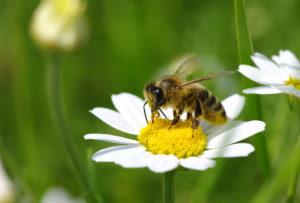
Tomorrow is National Honey Bee Day, a day dedicated to the humble honey bee and all of her hard work. What started as a grassroots effort by beekeepers to build community awareness of the bee industry, this program has spread nationally and is celebrated with various events around the country.
An important part of our food system, honey bees provide more than just honey to our diets. As premier pollinators, honey bees are responsible for about one in every three bites of food we eat, and it is thanks to them that we get to enjoy many of our favorite fruits, vegetables and nuts like cherries, watermelon, cucumbers, avocado, and almonds. Not only does this pollination work make for more diverse and delicious diets, but it is also worth more than $17 billion, according to research published in 2012.
We’ve been celebrating the honey bee all week long, sharing fun honey and bee facts on our Facebook, Twitter and Instagram accounts. In case you missed any, we’ve got them all below.
- The wings on a bee flap 190 times a second. That’s 11,400 times every minute, thus making their distinctive buzz!
- Research has shown that honey contains trace amounts of vitamins, minerals, amino acids, and antioxidants! That’s just another great reason to add more honey to your diet. (Be sure to check out our recipe section for some sweet inspiration!)
- Honey bees have to visit two million flowers just to make one pound of honey!
- Not all honey tastes the same. In fact, there are over 300 different varietals of honey in the United States including clover, blueberry, orange blossom & more! Each type has a unique flavor and color depending on the location of the flower nectar collected by the honey bees.
- A colony of bees has 50,000 bees but only one is the Queen. She’s the ultimate giver of life who focuses on the prosperity of her colony.
So, how are you celebrating National Honey Bee Day? Perhaps visiting with your local beekeeper to learn about bees and honey? Or maybe something as simple as planting your own pollinator-friendly garden? For more ideas, check out our five tips on how you can help the bees. However you celebrate, make it sweet!
